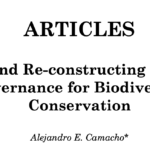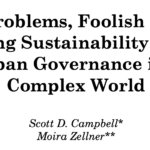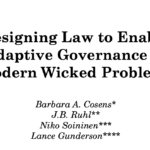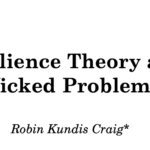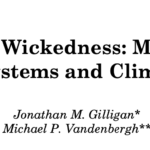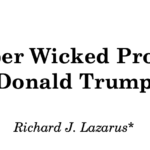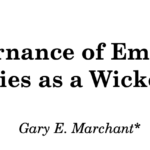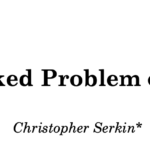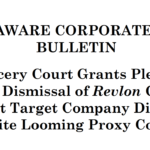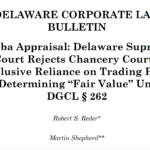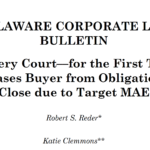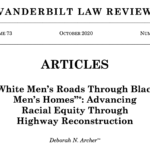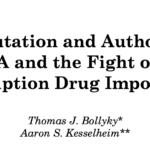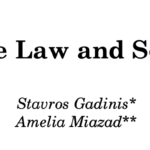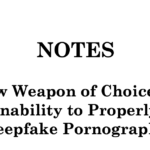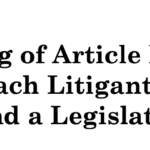Author
De- and Re-constructing Public Governance for Biodiversity Conservation
Dec. 22, 2020—Alejandro E. Camacho | 73 Vand. L. Rev. 1585 (2020) | Is biodiversity loss wicked? What has been done about it? And how might public governance be altered to improve the prognosis? A substantial and growing number of scholars have sought to define and characterize incredibly complex social problems, alternatively labelled as “messes,” “swamp[s],” “massive,”...
Wicked Problems, Foolish Decisions: Promoting Sustainability Through Urban Governance in a Complex World
Dec. 22, 2020—Scott D. Campbell & Moira Zellner | 73 Vand. L. Rev. 1643 (2020) | Why do wicked problems often give birth to bad policy choices? Put another way, why do people—in the face of complex social challenges—make misdiagnoses, ineffective decisions, or no decisions at all? Typical answers point to a plethora of suspects: impatience, myopia,...
Designing Law to Enable Adaptive Governance of Modern Wicked Problems
Dec. 22, 2020—Barbara A. Cosens, J.B. Ruhl, Niko Soininen & Lance Gunderson | 73 Vand. L. Rev. 1687 (2020) | In the twenty-first century, our planet is facing a period of rapid and fundamental change resulting from human domination so extensive it is expected to be visible in the geologic record. The accelerating rate of change compounds...
Resilience Theory and Wicked Problems
Dec. 22, 2020—Robin Kundis Craig | 73 Vand. L. Rev. 1733 (2020) | This Article posits, first, that resilience theory offers important insights into our understanding of wicked problems and, second, that to understand the value of resilience theory to wicked problems, we should start by going back to the context of Rittel’s and Webber’s 1973 delineation...
Beyond Wickedness: Managing Complex Systems and Climate Change
Dec. 22, 2020—Jonathan M. Gilligan & Michael P. Vandenbergh | 73 Vand. L. Rev. 1777 (2020) | This Article examines the argument that climate change is a “super wicked” problem. It concludes that the wicked problem concept is best viewed as a rhetorical device that served a valuable function in arguing against technocratic hubris in the early...
The Super Wicked Problem of Donald Trump
Dec. 22, 2020—Richard J. Lazarus | 73 Vand. L. Rev. 1811 (2020) | In 2009 I published a law review article that both explained why I believed that climate change was a “super wicked” problem for lawmakers and offered specific recommendations for ways that any laws addressing climate change should be crafted in light of its super...
Governance of Emerging Technologies as a Wicked Problem
Dec. 22, 2020—Gary E. Marchant | 73 Vand. L. Rev. 1861 (2020) | Governance of emerging technologies . . . presents a conundrum. No single optimum solution exists, but rather a collection of second-best strategies intersect, coexist, and—in some ways—compete. This situation seems unsatisfactory until it is observed through the lens of the “wicked problem” framework. The...
The Wicked Problem of Zoning
Dec. 22, 2020—Christopher Serkin | 73 Vand. L. Rev. 1879 (2020) | Zoning is the quintessential wicked problem. Professors Rittel and Webber, writing in the 1970s, identified as “wicked” those problems that technocratic expertise cannot necessarily solve. Wicked problems arise when the very definition of the problem is contested and outcomes are not measured by “right and...
Chancery Court Grants Pleading Stage Dismissal of Revlon Claims Against Target Company Directors Despite Looming Proxy Contest
Dec. 17, 2020—Robert S. Reder & Victoria D. Selover | 73 Vand. L. Rev. En Banc 249 (2020) | “In Rudd, Vice Chancellor Zurn rejected Plaintiff’s attempted reliance on Tangoe for the proposition that threat of a proxy contest, in and of itself, disabled otherwise independent and disinterested target company directors from making an unconflicted decision to...
Aruba Appraisal: Delaware Supreme Court Rejects Chancery Court’s Exclusive Reliance on Trading Price in Determining “Fair Value” Under DGCL § 262
Oct. 21, 2020—Robert S. Reder & Martin Shepherd | 73 Vand. L. Rev. En Banc 239 (2020) | “Consistent with DFC and Dell, Aruba II reaffirmed the important, if not dispositive, role that deal price usually plays in determining ‘fair value’ for purposes of DGCL § 262. One cannot ignore the fact that the Chancery Court retains broad...
Chancery Court––for the First Time–– Releases Buyer from Obligation to Close due to Target MAE
Oct. 21, 2020—Robert S. Reder & Katie Clemmons | 73 Vand. L. Rev. En Banc 227 (2020) | “Under the standard adopted by the Delaware Court of Chancery (‘Chancery Court’) in In re IBP Inc. Shareholders Litig., 789 A.2d 14 (Del. Ch. 2001) (‘IBP’), a buyer seeking release from its obligations under an acquisition agreement due to...
“White Men’s Roads Through Black Men’s Homes”: Advancing Racial Equity Through Highway Reconstruction
Oct. 19, 2020—Deborah N. Archer | 73 Vand. L. Rev. 1259 (2020) | Racial and economic segregation in urban communities is often understood as a natural consequence of poor choices by individuals. In reality, racially and economically segregated cities are the result of many factors, including the nation’s interstate highway system. In states around the country, highway...
Reputation and Authority: The FDA and the Fight over U.S. Prescription Drug Importation
Oct. 19, 2020—Thomas J. Bollyky & Aaron S. Kesselheim | 73 Vand. L. Rev. 1331 (2020) | There is popular and bipartisan support for legalizing the importation of lower-cost medicines from Canada to help reduce the high prescription drug costs that Americans pay. Despite the wide interest in this policy, attempts over the last sixteen years to...
Corporate Law and Social Risk
Oct. 19, 2020—Stavros Gadinis & Amelia Miazad | 73 Vand. L. Rev. 1401 (2020) | Over a quarter of total assets under management are now invested in socially responsible companies. This turn to sustainability has gained solid ground over the last few years, earning the commitment of hundreds of CEOs and dominating the global business agenda. This...
“The New Weapon of Choice”: Law’s Current Inability to Properly Address Deepfake Pornography
Oct. 19, 2020—Anne Pechenik Gieseke | 73 Vand. L. Rev. 1479 (2020) | Deepfake technology uses artificial intelligence to realistically manipulate videos by splicing one person’s face onto another’s. While this technology has innocuous usages, some perpetrators have instead used it to create deepfake pornography. These creators use images ripped from social media sites to construct—or request...
The Standing of Article III Standing for Data Breach Litigants: Proposing a Judicial and a Legislative Solution
Oct. 19, 2020—Devin Urness | 73 Vand. L. Rev. 1517 (2020) | Data breaches are not going away. Yet victims still face uncertainty when deciding whether and where to file cases against companies or other institutions that may have mishandled their information. This is especially true if the victims have not yet experienced a financial harm, like...
